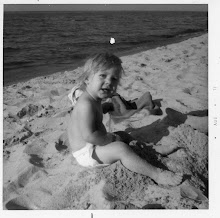

The passage in Lucille's journal, in June 1932 goes on to say:
Jesus is God talking to the man on the street.
He is the speech of eternity translated into the language of time.
Old Simeon knew Jesus wrapped in a blanket! Orthodox scribes didn't know him when he raised the dead.
God's last word is Christ.
He donned the tapestry of human flesh. Folks were deceived by the wrappings he wore.
He's talking to the man on the street, because he loves him.
He's speaking in the languages of time so all who hear may know.
He's willing to be seen and known by any who will recognize him for who he is.
God's last word is Christ.
Have we recognized him, acknowledged him today? As we move about in the tapestry of our own humanity, can we consider the wrappings he wore, for us?
He had hands like my own -- hands capable of creating, touching, working, holding.
He enjoyed good food and loved his friends.
He breathed in morning air, cool and misted and he may have marveled like I do at dew-sparkles on blades of grass, as little green fields of diamonds.
He was remarkably, totally human in order that we might recognize him as God. And the gospel of his life, the manner in which he lived and died, testified that to God, all people matter. He spoke to the man on the street, talked in the language that people understood, began like the rest of us, a mere, helpless babe wrapped in blankets. Do you know him? Can you see him?
Does it matter?
When I was in Soddo, Ethiopia, a baby arrived at the orphanage. His arrival was simple, no balloon bouquets or staff of nurses floated around a hospital room in anticipation of his birth. His arrival was frightening -- his mother was a teenager, a victim of hostile rape, she had no milk, no hope at all to provide for him. Stoic she sat and retold her story.
The baby was as naked at three days old as he was the night of his birth. Not a stitch of clothing, only pieces of cloth wrapped about him as a makeshift blanket. He was three days old and had not tasted milk. His body was surviving on water and the nourishment he had taken from his mother in the womb.
He was desperate and didn't know it.
He was starving yet had not the slightest idea of what it felt to be satisfied.
He was a victim of a circumstance larger than any of us know how to handle, to fix.
Yet his black eyes shone, his tiny fingers, perfectly formed, grasped with strength and precision of movement. He seemed to me very much like how Jesus may have been:
A baby born to a young woman under questionable beginnings -- weren't she and Joseph merely betrothed? They were desperately poor, had nothing but cloths to wrap the child and when he wasn't at the breast of his exhausted mother, he rested in a feeding trough.
The baby I held will soon be welcomed with grand fanfare into a family far away from his humble beginnings; a family that will value his life, invest in his future, delight in his babbling and first steps and base-hits. But, I saw in that baby, my Jesus. When I held him and watched him wrestle milk out of a little bottle, all I could think was, "This is why there is Jesus, because we are all like this tiny thing. This is the man on the street, his quiet cry the speech of eternity."
Do you, like old Simeon, recognize him? Do you know why he came? Can you find God today in the wrappings of your life?


Your experience in the orphanage with the newborn babe was amazing. What a gift to be present at the start of his life, which will no doubt be redeemed by Christ! Wouldn't it be awesome to be able to keep track of him?
ReplyDelete